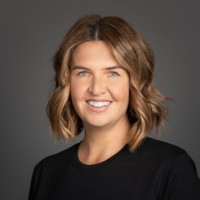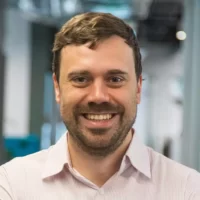-

Niko Sünderhauf
General Chair
Queensland University of Technology
Professor Niko Sünderhauf is Deputy Director (Research) of the ARC Research Hub (ITRH) in Intelligent Robotic Systems for Real-Time Asset Management and Chief Investigator and member of the Executive Committee of the QUT Centre for Robotics (QCR). Niko conducts research in robotic vision, at the intersection of robotics, computer vision, and machine learning. His research interests focus on scene understanding and how robots can learn to perform complex tasks that require navigation and interaction with objects, the environment, and humans.
-

Katrina Tune
Conference Manager
Katrina was the Chief Operating Officer for the ARC Centre of Excellence for Robotic Vision (ACRV) between 2019 – 2021. In this role she assisted with the coordination of the 2020 and 2021 Robotic Vision Summer Schools and witnessed firsthand the outstanding opportunity offered to students of this program, to develop skills and knowledge in the fields of robotic vision.
Katrina also coordinated the establishment of Robotic Vision Australia, a legacy activity of ACRV designed to advance education in the fields of robotics, computer vision and artificial intelligence through a number of priority areas; including developing human capital through the Robotic Vision Summer School. Katrina is the current secretary of Robotic Vision Australia.
-

Donald G Dansereau
University of Sydney
Dr Donald Dansereau is a senior lecturer in the School of Aerospace, Mechanical and Mechatronic Engineering, and the Perception Theme Lead for the Sydney Institute for Robotics and Intelligent Systems. His work explores how new imaging devices can help robots see and do, encompassing the design, fabrication, and deployment of new imaging technologies. In 2004 he completed an MSc at the University Calgary, receiving the Governor General’s Gold Medal for his pioneering work in light field processing. In 2014 he completed a PhD on underwater robotic vision at the Australian Centre for Field Robotics, followed by postdoctoral appointments at QUT and Stanford University. Donald’s industry experience includes physics engines for video games, computer vision for microchip packaging, and chip design for automated electronics testing.
-

Tobias Fischer
Queensland University of Technology
Dr Tobias Fischer (www.tobiasfischer.info) conducts interdisciplinary research at the intersection of intelligent robotics, computer vision, and computational cognition. His main goal is to develop high-performing, bio-inspired computer vision algorithms that simultaneously examine animals/humans and robots’ perceptional capabilities. Since January 2022 Tobias has been a Lecturer in the QUT Centre for Robotics. He joined QUT as an Associate Investigator and Research Fellow working with Professor Michael Milford in January 2020. Previously, Dr Fischer was a postdoctoral researcher in the Personal Robotics Lab at Imperial College London. He received a PhD from Imperial College in January 2019. Tobias’ thesis was awarded the UK Best Thesis in Robotics Award 2018 and the Eryl Cadwaladr Davies Award for the best thesis in Imperial’s EEE Department in 2017-2018. He previously received an M.Sc. degree (distinction) in Artificial Intelligence from The University of Edinburgh in 2014 and a B.Sc. degree in Computer Engineering from Ilmenau University of Technology, Germany, in 2013. His works have attracted two best poster awards, one best paper award, and he is the senior author of the winning submission to the Facebook Mapillary Place Recognition Challenge 2020.
-

Dimity Miller
Queensland University of Technology
Dimity is a Chief Investigator with the QUT Centre for Robotics, and a Lecturer with the QUT School of Electrical Engineering and Robotics. She obtained her PhD in 2021 from QUT, which was recognised by an Executive Dean’s Commendation for Outstanding Doctoral Thesis Award in 2022. Her research expertise is in reliable robotic vision – operating at the intersection of deep learning, computer vision, and robotics. In particular, she is passionate about understanding when and why computer vision models may fail in robotic applications, and developing techniques to mitigate this. Her research interests span across topics including uncertainty estimation, object detection, continuous learning, deep learning introspection, metrics for assessing model performance, and spatiotemporal learning.
-

Feras Dayoub
University of Adelaide
Dr Feras Dayoub is a Senior Lecturer with the School of Computer Science at the University of Adelaide and the Australian Institute for Machine Learning (AIML). He is also an Associate Investigator with QUT Centre for Robotics (QCR). He served as a Chief Investigator of the ARC Centre of Excellence for Robotic Vision (concluded in 2020). His research focuses on enabling the reliable deployment of computer vision and machine learning on mobile robots in real-world environments. He has extensive experience in applied robotic vision research resulting from his work on exciting projects such as AGRobotic detection of weed in farms using deep learning, vision-enabled autonomous underwater vehicles (AUV) to protect the Great Barrier Reef from Crown-of-Thorns Starfish and vision-based infrastructure inspection using unmanned aerial vehicles (UAV). He has also lectured in advanced robotics topics for undergraduates, where he taught Bayesian approaches to robot localisation, mapping, and Simultaneous Localisation and Mapping (SLAM).
-

Jesse Haviland
Queensland University of Technology
Dr Jesse Haviland graduated from QUT in 2018 with First Class Honours in a Bachelor of Electrical Engineering. He was welcomed to the world of research by his supervisor, Peter Corke when he completed his honours project, and a Vacation Research Experience Scheme (VRES) on the project “Interactive Voice Interface for Robotic Manipulation Demonstrator” in 2018/2019. Jesse completed his PhD in 2022 with the QUT Centre for Robotics (QCR), supervised by Peter Corke. He is now working as a postdoctoral research fellow with QCR. His research is concerned with mobile manipulation and how vision based mobile platforms can achieve useful outcomes in unstructured environments.






